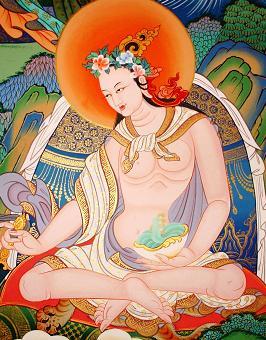In the Buddhist tradition I've studied in since 2006, there's a lineage chant listing the line of enlightened beings who handed down teachings. I've said that list -- which includes the name Yeshe Tsogyel -- hundreds of times, but I didn't know much about her, other than that she associated with Padmasambhava, founder of the Nyingma lineage, until I recently read a couple of books by Buddhist feminists.
This account is from "Buddhism After Patriarchy" by Rita M. Gross:
Born in 8th century Tibet, it's said thatYeshe Tsogyel's mother had visions at her conception and throughout pregnancy. Her birth was said to be auspicious, but her parents were mainly concerned with finding her a husband. With suitors threatening to go to war over her beauty, Yeshe Tosgyel was sent into the wild, and the man who found her would be her husband.
She wasn't interested in the plan and resisted her captor, giving in only after her back had been beaten to a bloody pulp. She escaped when they were passed out drunk. She was found by an emperor, who took her as his consort, then gave her to the guru Padmasambhava as an offering. This suited her, as she desired to study the dharma, but he soon sent her to Nepal to find a consort of her own. She did, then went into a three-year retreat before returning to Padmasambhava, who confirms her realizations.
She worked extensively to study and spread Buddhism, gaining many disciples, male and female, and bringing them to high levels of realization. She also wrote down many teachings, hiding many of them to be found later at appropriate times.
Her final practice was exchanging her karma for others', taking on their suffering and giving them what would relieve it. She fed the hungry, gave medicine to the sick, and made the poor wealthy. She made emanations that helped people in many locations.
After 12 years of this, she died, leaving many signs of her greatness.
Gross notes two things:
-- The prevalance of her abuse by males throughout the story, whch include being treated as property, beaten, and raped. She twice converted men to the dharma by giving "aggressive depraved men insights into the roots of their aggression and keys to handling that more effectively."
-- Her relationships with women, including other of Padmasambhava's consorts. Four of her 11 root disciples were women, and two were recognized, as she was, as emanations of Vajravarahi. At the end of her life, Yeshe Tsogyel was visited by Mandarava, the other main consort. "We exchanged and tightened our precepts, making endless discussions on the dharma," it is said.
Gross offers these two contrasting accounts:
From Yeshe Tsogyel:
I am a woman --I have little power to resist danger.
Because of my inferior birth, everyone attacks me.
If I go as a beggar, dogs attack me.
If I have wealth and food, bandits attack me.
If I do a great deal, locals attack me.
If I do little, gossips attack me.
If anything goes wrong, they all attack me.
Whatever I do, I have no chance for happiness.
Because I am a woman, it is hard to follow the Dharma
It is hard even to stay alive.
from Padmasambhava:
Wonderful yogini, practitioner of the secret teachings
The basis for realizing enlightenment is a human body
Male or female -- there is no great difference.
But if she develops the mind bent on enlightenment,
A woman's body is better.
Subscribe to:
Post Comments (Atom)


No comments:
Post a Comment